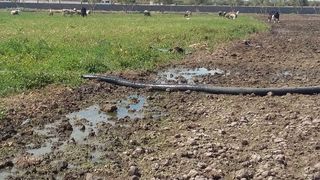 The on-going thesis aims to study and compare the design and implementation of the treated wastewater reuse policy for agricultural purposes in Morocco and Tunisia. With the threat of water stress, this alternative solution to traditional increase of water supply policies (such as dams, canals, tanks), is widely encouraged by national and international stakeholders. Considered as being “innovative”, the policy is however far from being new as it dates back to the sixties in Tunisia and the nineties in Morocco. Despite an ambitious policy formulation on the national level, the results on the local level remain relatively modest. Would national “words” count more that the effective implementation? Using a sociological approach of public policy, the point in question is to analyze the policy’s conditions of emergence and spread on the international and national levels, to identify the political entrepreneurs and their games of policy influence so as to better understand the relationship between knowledge, technology and power. The institutional and symbolic dimensions will also be able to show the changes induced by the implementation process such as social relationships, learning processes and discursive strategies.
The on-going thesis aims to study and compare the design and implementation of the treated wastewater reuse policy for agricultural purposes in Morocco and Tunisia. With the threat of water stress, this alternative solution to traditional increase of water supply policies (such as dams, canals, tanks), is widely encouraged by national and international stakeholders. Considered as being “innovative”, the policy is however far from being new as it dates back to the sixties in Tunisia and the nineties in Morocco. Despite an ambitious policy formulation on the national level, the results on the local level remain relatively modest. Would national “words” count more that the effective implementation? Using a sociological approach of public policy, the point in question is to analyze the policy’s conditions of emergence and spread on the international and national levels, to identify the political entrepreneurs and their games of policy influence so as to better understand the relationship between knowledge, technology and power. The institutional and symbolic dimensions will also be able to show the changes induced by the implementation process such as social relationships, learning processes and discursive strategies.
Keywords: Innovation, Wastewater Reuse, governance
Photo: ©Audrey Massot






